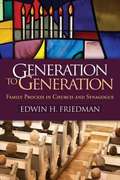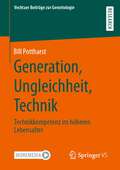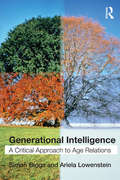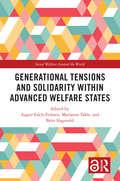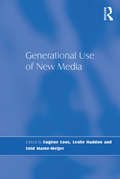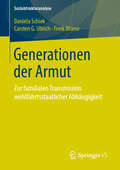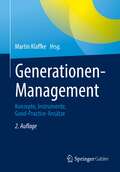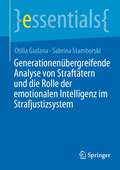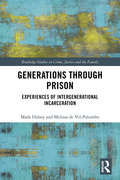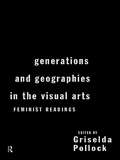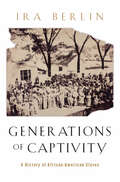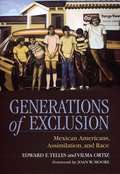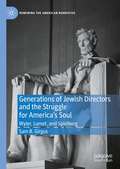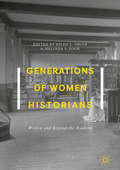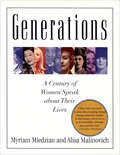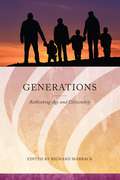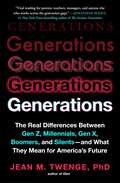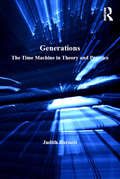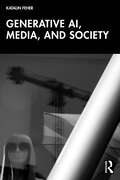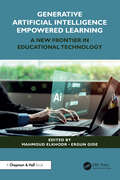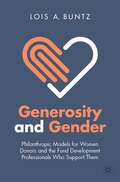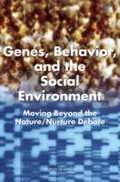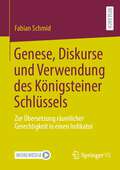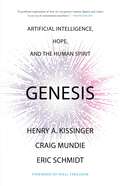- Table View
- List View
Generation to Generation
by Edwin H. Friedman Mickie Crimone Gary EmanuelAn acclaimed, influential work now available in paper for the first time, this bestselling book applies the concepts of systemic family therapy to the emotional life of congregations. Edwin H. Friedman shows how the same understanding of family process that can aid clergy in their pastoral role also has important ramifications for negotiating congregational dynamics and functioning as an effective leader. Clergy from diverse denominations, as well as family therapists and counselors, have found that this book directly addresses the dilemmas and crises they encounter daily. It is widely used as a text in courses on family systems and pastoral care.
Generation, Ungleichheit, Technik: Technikkompetenz im höheren Lebensalter (Vechtaer Beiträge zur Gerontologie)
by Bill PottharstIn diesem Buch wird versucht, die Theorieansätze der Technikgenerationen mit jenen der sozialen Ungleichheit auf eine Weise zu verbinden, dass Rückschlüsse auf die Technikakzeptanz, die Technikkompetenz und die Techniknutzung im höheren Lebensalter abgeleitet werden können. Technikroutinen werden im höheren Lebensalter insbesondere durch Prägungen im Lebensverlauf und die soziale Lage in der aktuellen Lebenssituation bestimmt. Unerlässlich scheint, älteren Menschen Zugang zu neuen Technologien zu ermöglichen, ihnen jedoch ebenso genügend Freiraum dafür einzuräumen, auf den Einsatz ungewollter Technologien verzichten zu können.
Generational Intelligence: A Critical Approach to Age Relations
by Simon Biggs Ariela LowensteinThe question of communication and understanding between different generations is emerging as a key issue for the twenty-first century. The advent of ageing populations may lead to increased conflict or solidarity in society, and provokes a profound ambivalence both in public and in the private sphere. In a new approach, Biggs and Lowenstein offer a critical examination of Generational Intelligence as one way of addressing these issues. How easy is it to put yourself in the shoes of someone of a different age group? What are the personal, interpersonal and social factors that affect our perceptions of the ‘age other’? What are the key issues facing families, workplaces and communities in an ageing society? This book sets out a way of thinking about interpersonal relations based on age, and the question of communication between people of different ages and generations. The book challenges existing orthodoxies for relations between adults of different ages and draws out steps that can be taken to increase understanding between generational groups. The authors outline a series of steps that can be taken to enhance Generational Intelligence, examine existing theories and social issues, and suggest new directions for sustainable relations between generational groups.
Generational Tensions and Solidarity Within Advanced Welfare States (Social Welfare Around the World)
by Asgeir Falch-Eriksen, Marianne Takle, and Britt SlagsvoldThis book explores generation as both a reference to family or kinship structures, and a reference to cohorts or age sets. The principal objective is branching out this two-part concept through studies of tensions and solidarity within and between generations of advanced and robust welfare states. Answering key questions using multiple disciplinary approaches, the book considers how generations challenge advanced and robust welfare states; how new and young generations are affected by living in an advanced welfare state with older generations; how tensions or solidarity are understood when facing challenges; and what the key characteristics are of certain generation types. It contributes to the development of a more comprehensive generation approach within social sciences by developing the concept of generation by exploring different challenges to the welfare state such as migration, digitalization, environmental damages, demands for sustainability, and marginalization. Highlighting the escalating tensions and altered versions of solidarity between generations, this book shows how a comprehensive concept of a generation can create new insights into how we collectively coordinate and resolve challenges through the welfare state. It will be of interest to all scholars and students of social policy, sociology, political science, and social anthropology.
Generational Use of New Media
by Leslie Haddon Enid Mante-MeijerGenerational Use of New Media examines and contrasts how younger and older people, representing different generations, engage with the new media that they increasingly encounter in everyday life. Exploring the various assumptions about the degrees to which younger and older people are more or less willing to use, or are capable of using, new media, the social circumstances under which they do so and the very design of those media, this book critically examines the gap that is assumed to exist between younger users of new media and older non-users. Thematically organised and offering comparative analyses of the generational use of new media and technology, this timely volume presents the latest research and rich new empirical material gathered in the EU, USA and Hong Kong, to reflect on societal practices and the practical implications of building a more inclusive information society.
Generationen der Armut: Zur familialen Transmission wohlfahrtsstaatlicher Abhängigkeit (Sozialstrukturanalyse)
by Carsten G. Ullrich Daniela Schiek Frerk BlomeIn diesem Buch wird einer qualitative Studie zur intergenerationellen Armutstransmission in Deutschland vorgestellt. Anhand von familiengeschichtlichen Mehrgenerationengesprächen mit erwachsenen Mitgliedern unterprivilegierter Familien zeigen die Autor*innen, inwiefern es zur Reproduktion unentrinnbarer Schicksalsgemeinschaften oder zu Abschieden aus diesen kommen kann.
Generationen-Management: Konzepte, Instrumente, Good-Practice-Ansätze
by Martin KlaffkeDer demografische Wandel führt nicht nur zu einem Rückgang der Erwerbsbevölkerung, sondern auch zu neuen Ansprüchen und Vorstellungen der Beschäftigten im Arbeitsleben. Dessen ungeachtet setzen Arbeitgeber ihre Prioritäten beim Demografie-Management noch überwiegend in den Bereichen Gesundheitsförderung und Nachwuchsgewinnung. Dies reicht jedoch nicht aus, um in digitalen Zeiten eine wettbewerbsfähige Belegschaft aufzubauen. Denn für die Zukunftsfähigkeit von Unternehmen kommt es neben der Arbeitsfähigkeit vor allem auf die Kooperationsbereitschaft und das Engagement der Mitarbeitenden jeden Alters an.Generationen-Management steigert die Arbeitgeberattraktivität und nutzt das Potenzial altersgemischter Belegschaften nachhaltig zum Vorteil von Beschäftigten und Unternehmen. Hierbei sind drei Handlungsfelder wesentlich: die organisationalen und arbeitspolitischen Rahmenbedingungen gestalten, die lebenslange Leistungsfähigkeit fördern und die intergenerative Wertschätzung und Zusammenarbeit stärken. Mit umfangreichen Praxis-Tipps zeigen Expertinnen und Experten auf, wie Arbeitgeber die Fähigkeit zum Management einer Mehr-Generationen-Belegschaft gezielt entwickeln und sich einen handfesten Wettbewerbsvorteil erarbeiten können
Generationenübergreifende Analyse von Straftätern und die Rolle der emotionalen Intelligenz im Strafjustizsystem (essentials)
by Otilia Gudana Sabrina StamborskiIm Jahr 1996 wurde Gewalt weltweit zum Gesundheitsproblem erklärt und identifiziert. Das Risiko von Mord und Selbstmord erreichte epidemische Ausmaße und betraf bestimmte Bevölkerungsgruppen, darunter Jugendliche und Angehörige von Minderheitengruppen. Die Selbstmordraten bei Jugendlichen und jungen Erwachsenen (15 bis 24 Jahre) haben sich zwischen 1950 und 1990 fast verdreifacht. Ebenso haben sich die Mordraten bei 15- bis 19-jährigen Männern von 1985 bis 1991 fast verdoppelt. Diese Trends löste weltweit Alarm aus und verlangten nach neuen Lösungen.Die Motivation dieses Buches bestand darin, das Niveau der emotionalen Intelligenz von Kriminellen in Gefängnissen und in forensischen psychiatrischen Einrichtungen zu vergleichen. Das Hauptziel dieser Analyse besteht darin, sich auf Empfehlungen zum Training emotionaler Intelligenz zu konzentrieren, um die epidemische Gewaltraten von Insassen auf globaler Ebene zu senken.
Generations Through Prison: Experiences of Intergenerational Incarceration (Routledge Studies in Crime, Justice and the Family)
by Mark Halsey Melissa de Vel-PalumboAround one in five prisoners report the previous or current incarceration of a parent. Many such prisoners attest to the long-term negative effects of parental incarceration on one’s own sense of self and on the range and quality of opportunities for building a conventional life. And yet, the problem of intergenerational incarceration has received only passing attention from academics, and virtually little if any consideration from policy makers and correctional officials. This book – the first of its kind – offers an in-depth examination of the causes, experiences and consequences of intergenerational incarceration. It draws extensively from surveys and interviews with second-, third-, fourth- and fifth-generation prisoners to explicate the personal, familial and socio-economic contexts typically associated with incarceration across generations. The book examines 1) the emergence of the prison as a dominant if not life-defining institution for some families, 2) the link between intergenerational trauma, crime and intergenerational incarceration, 3) the role of police, courts, and corrections in amplifying or ameliorating such problems, and 4) the possible means for preventing intergenerational incarceration. This is undeniably a book that bears witness to many tragic and traumatic stories. But it is also a work premised on the idea that knowing these stories – knowing that they often resist alignment with pre-conceived ideas about who prisoners are or who they might become – is part and parcel of advancing critical debate and, more importantly, of creating real change. Written in a clear and direct style, this book will appeal to students and scholars in criminology, sociology, cultural studies, social theory and those interested in learning about more about families in prison.
Generations and Geographies in the Visual Arts: Feminist Readings
by Griselda PollockIn Generations and Geographies in the Visual Achallenge of Arts: Feminist Readings the challenge of contemporary feminist theory encounters the provocation of the visual arts made by women in the twentieth century. The major issue is difference: sexual, cultural and social. The book points to the singularity of each artist's creative negotiation of time and historical and political circumstance. Griselda Pollock calls attention to the significance of place, location and cultural diversity, connecting issues of sexuality to those of nationality, imperialism, migration, diaspora and genocide.
Generations of Captivity: A History of African-American Slaves
by Ira BerlinIra Berlin traces the history of African-American slavery in the United States from its beginnings in the seventeenth century to its fiery demise nearly three hundred years later. Most Americans, black and white, have a singular vision of slavery, one fixed in the mid-nineteenth century when most American slaves grew cotton, resided in the deep South, and subscribed to Christianity. Here, however, Berlin offers a dynamic vision, a major reinterpretation in which slaves and their owners continually renegotiated the terms of captivity. Slavery was thus made and remade by successive generations of Africans and African Americans who lived through settlement and adaptation, plantation life, economic transformations, revolution, forced migration, war, and ultimately, emancipation. Berlin’s understanding of the processes that continually transformed the lives of slaves makes Generations of Captivity essential reading for anyone interested in the evolution of antebellum America. Connecting the “Charter Generation” to the development of Atlantic society in the seventeenth century, the “Plantation Generation” to the reconstruction of colonial society in the eighteenth century, the “Revolutionary Generation” to the Age of Revolutions, and the “Migration Generation” to American expansionism in the nineteenth century, Berlin integrates the history of slavery into the larger story of American life. He demonstrates how enslaved black people, by adapting to changing circumstances, prepared for the moment when they could seize liberty and declare themselves the “Freedom Generation.” This epic story, told by a master historian, provides a rich understanding of the experience of African-American slaves, an experience that continues to mobilize American thought and passions today.
Generations of Exclusion: Mexican Americans, Assimilation, and Race
by Edward E. Telles Vilma OrtizForeword by Joan W. Moore. When boxes of original files from a 1965 survey of Mexican Americans were discovered behind a dusty bookshelf at UCLA, sociologists Edward Telles and Vilma Ortiz recognized a unique opportunity to examine how the Mexican American experience has evolved over the past four decades. Telles and Ortiz located and re-interviewed most of the original respondents and many of their children. Then, they combined the findings of both studies to construct a thirty-five year analysis of Mexican American integration into American society. Generations of Exclusion is the result of this extraordinary project. Generations of Exclusion measures Mexican American integration across a wide number of dimensions: education, English and Spanish language use, socioeconomic status, intermarriage, residential segregation, ethnic identity, and political participation. The study contains some encouraging findings, but many more that are troubling. Linguistically, Mexican Americans assimilate into mainstream America quite well--by the second generation, nearly all Mexican Americans achieve English proficiency. In many domains, however, the Mexican American story doesn't fit with traditional models of assimilation. The majority of fourth generation Mexican Americans continue to live in Hispanic neighborhoods, marry other Hispanics, and think of themselves as Mexican. And while Mexican Americans make financial strides from the first to the second generation, economic progress halts at the second generation, and poverty rates remain high for later generations. Similarly, educational attainment peaks among second generation children of immigrants, but declines for the third and fourth generations. Telles and Ortiz identify institutional barriers as a major source of Mexican American disadvantage. Chronic under-funding in school systems predominately serving Mexican Americans severely restrains progress. Persistent discrimination, punitive immigration policies, and reliance on cheap Mexican labor in the southwestern states all make integration more difficult. The authors call for providing Mexican American children with the educational opportunities that European immigrants in previous generations enjoyed. The Mexican American trajectory is distinct--but so is the extent to which this group has been excluded from the American mainstream. Most immigration literature today focuses either on the immediate impact of immigration or what is happening to the children of newcomers to this country. Generations of Exclusion shows what has happened to Mexican Americans over four decades. In opening this window onto the past and linking it to recent outcomes, Telles and Ortiz provide a troubling glimpse of what other new immigrant groups may experience in the future.
Generations of Jewish Directors and the Struggle for America’s Soul: Wyler, Lumet, and Spielberg (Renewing the American Narrative)
by Sam B. GirgusFrom generation to generation, three outstanding American Jewish directors—William Wyler, Sidney Lumet, and Steven Spielberg--advance a tradition of Jewish writers, artists, and leaders who propagate the ethical basis of the American Idea and Creed. They strive to renew the American spirit by insisting that America must live up to its values and ideals. These directors accentuate the ethical responsibility for the other as a basis of the American soul and a source for strengthening American liberal democracy. In the manner of the jeremiad, their films challenge America to achieve a liberal democratic culture for all people by becoming more inclusive and by modernizing the American Idea. Following an introduction that relates aspects of modern ethical thought to the search for America’s soul, the book divides into three sections. The Wyler section focuses on the director’s social vision of a changing America. The Lumet section views his films as dramatizing Lumet’s dynamic and aggressive social and ethical conscience. The Spielberg section tracks his films as a movement toward American redemption and renewal that aspires to realize Lincoln’s vision of America as the hope of the world. The directors, among many others, perpetuate a “New Covenant” that advocates change and renewal in the American experience.
Generations of Women Historians: Within and Beyond the Academy
by Melinda S. Zook Hilda L. SmithThis collection focuses on generations of early women historians, seeking to identify the intellectual milieu and professional realities that framed their lives. It moves beyond treating them as simply individuals and looks to the social and intellectual forces that encouraged them to study history and, at the same time, would often limit the reach and define the nature of their study. This collection of essays speaks to female practitioners of history over the past four centuries that published original histories, some within a university setting and some outside. By analysing the values these early women scholars faced, readers can understand the broader social values that led women historians to exist as a unit apart from the career path of their male colleagues.
Generations: A Century of Women Speak about Their Lives
by Myriam Miedzian Alisa MalinovichWhat are the differences in how your grandmother, your mother, and your daughter experience the world? Compare the story of your grandmother’s first date with you mother’s, your mother’s volunteer work with your own career, your great-grandmother’s education and expectations with those of a teen today. The women in this landmark work of oral history are from diverse ethnic, geographic, and social backgrounds, and they tell stories about all aspects of their lives, from their professional and romantic experiences to sex discrimination and their own realized or unrealized aspirations. The result is a dynamic and captivating portrait that all women will find themselves in, and a work which will stand as one of the lasting documents of century that very well may be remembered as the Women’s Century.In recent decades volumes have been written on women’s history and the effects the feminist movement has had on American culture. But something is missing from these accounts: how the reality and day-to-day texture of women’s lives-whether or not they ever considered themselves "feminists”-have been transformed over the course of the twentieth century. As in the best oral history, the stories these women candidly tell are vivid and often poignantly detailed. We hear accounts of rural, chore-filled childhoods at the beginning of the century, of contemporary teens without curfews, of dates that began with a chat with father in the parlor, of the sexual liberation of the 1960s, of women who worked in factories during World War II, of those who were pioneers in their professions, and of women who today struggle heroically to balance the demands of marriage or single mothering, work, and children.Sweeping in scope, and yet rooted in the details, emotions, and dilemmas of everyday life, the journey women have traveled over the century here becomes all the more dramatic, the transformation they have undergone all the more remarkable. Generations is a celebration of this transformation in all its complexity, an embracing and vibrant family scrapbook that belongs to all American women.
Generations: Rethinking Age and Citizenship (Series in Citizenship Studies)
by Richard MarbackThe meaning of citizenship and the way that it is expressed by an individual varies with age, develops over time, and is often learned by interacting with members of other generations. In Generations: Rethinking Age and Citizenship, editor Richard Marback presents contributions that explore this temporal dimension of membership in political communities through a variety of rich disciplinary perspectives. While the role of human time and temporality receive less attention in the interdisciplinary study of citizenship than do spatial dynamics of location and movement, Generations demonstrates that these factors are central to a full understanding of citizenship issues. Essays in Generations are organized into four sections: Age, Cohort, and Generation; Young Age, Globalization, Migration; Generational Disparities and the Clash of Cultures; and Later Life, Civic Engagement, Disenfranchisement. Contributors visit a range of geographic locations--including the U.S., U.K., Europe, and Africa--and consider the experiences of citizens who are native born, immigrant, and repatriated, in time periods that range from the nineteenth century to the present. Taken together, the diverse contributions in this volume illustrate the ways in which personal experiences of community membership change as we age, and also explore how experiences of civic engagement can and do change from one generation to the next. Teachers and students of citizenship studies, cultural studies, gerontology, sociology, and political science will enjoy this thought-provoking look at age, aging, and generational differences in relation to the concept and experience of citizenship.
Generations: The Real Differences Between Gen Z, Millennials, Gen X, Boomers, and Silents—and What They Mean for America's Future
by Jean M. TwengeA groundbreaking, &“lavishly informative&” (The New York Times) portrait of the six generations that currently live in the United States and how they connect, conflict, and compete with one another—from the acclaimed author of Generation Me and iGen.Upending the conventional theory that generational differences are caused by major events, Dr. Jean Twenge analyzes data on 39 million people from robust national surveys—some going back nearly a century—to show that changes in technology are the underlying driver of each generation&’s unique makeup. In this revelatory work, Twenge outlines key shifts in attitudes and lifestyle choices that define each generation regarding gender, income, politics, race, sexuality, marriage, mental health, and much more. Surprising, engaging, and informative, Generations &“gets you thinking about how appreciating generational differences can, ironically, bring us together&” (Angela Duckworth, New York Times bestselling author). It will forever change the way you view your parents, peers, coworkers, and children, no matter which generation you call your own.
Generations: The Time Machine in Theory and Practice
by Judith BurnettGenerations: The Time Machine in Theory and Practice challenges the fragmented and diverse use of the concept of generation commonly found in the social sciences. It approaches the concept in a manner that stretches the sociological imagination away from its orientation toward the present by building the concept of the passage of time into our understanding of the social. It proposes an innovative and exciting view of the field of generations, lifting it out from life course and cohort analysis, and reconstituting the area with fresh and dynamic ways of seeing. With its unique, intellectually innovative and sustained critical study of generational work, Generations will appeal to scholars across a range of social sciences and humanities, and will be of particular interest to social theorists and anthropologists, as well as sociologists of social history, consumption, identity and culture.
Generative AI, Media, and Society
by Katalin FeherThis groundbreaking book demystifies generative AI’s transformative impact on media, socio-cultural dynamics, ethics, and policy.Defining generative AI as an evolutionary leap in the development of artificial intelligence, the author examines intricate human-machine interactions and socio-technical dynamics, advocating robust, proactive AI governance to address emerging uncertainties. The book is clearly structured into six key chapters, each exploring distinct aspects of the relationship between artificial intelligence, media, and society. The chapter on "Transformation" examines how machine behavior is reshaping our datafied society, questioning whether data is the new oil, or digital manure. "Generative AI" investigates the models and future impacts of generative AI as a co-intelligence, revisiting the Turing Test and analyzing societal-business impacts. "AI Media" explores the convergence of media and AI, highlighting robot journalism, synthetic content, and the disinformation era and discussing the trend toward high-risk optimism. "Uncertainties" addresses inherent unpredictability vs. strategic foresight, focusing on challenged business models, sustainability concerns, and emotional intelligence factors. "Ethics" analyzes generative morality and dual-use technology, covering trusted AI principles—from misuse to integrative solutions. Finally, "Policy" discusses governance, labor market impacts, the importance of human rights and power dynamics in generative AI. Each chapter also provides summaries of impact projects, reflective art, scholarly questions, and strategic takeaways—extended with a comprehensive glossary.This is an essential resource for scholars, students, policymakers, technologists, ethicists, and AI industry leaders seeking to rapidly understand and address the challenges and opportunities of generative AI and AI media in a cohesive framework.
Generative Artificial Intelligence Empowered Learning: A New Frontier in Educational Technology
by Mahmoud Elkhodr Ergun GideThis book explores the integration of Generative Artificial Intelligence (GenAI), such as ChatGPT, into educational practices and research methodologies. With the potential to transform traditional learning environments, this book addresses both the opportunities and challenges that come with leveraging GenAI for enhancing teaching and learning experiences.This comprehensive guide delves into multiple aspects of GenAI in education. It covers critical topics such as project-based learning (PBL), personalized learning through AI, AI-driven student assessment, and the role of AI in special education. Furthermore, it examines ethical considerations, the readiness of students and teachers for AI technologies, and case studies on AI’s impact on student outcomes. With insights from educators, researchers, and practitioners from around the globe, the book provides a balanced perspective on both theoretical frameworks and practical implementation of GenAI technologies.Ideal for educators, researchers, and policymakers, this book serves as a practical resource for those looking to effectively integrate AI into their pedagogical and research efforts. It is an essential reference for anyone interested in staying at the forefront of educational innovation and exploring the future possibilities of AI-empowered learning.
Generosity and Gender: Philanthropic Models for Women Donors and the Fund Development Professionals Who Support Them
by Lois A. BuntzThe social, political, and economic environment is ripe with opportunity to engage women and their philanthropy. Professionals working in the field of philanthropy want ideas, practical information, research, and guidance about how to work with women donors, how to build women’s philanthropy initiatives, and how to integrate this subset of donors into their current fund development departments. This book offers insight into the three historical waves of women’s philanthropy and provides a summary of current research and inspiring stories collected from interviews with more than 70 women philanthropists and leaders. Each chapter begins with current research, followed by interviews and examples, and ends with suggestions for fundraisers on how to implement the information into a women’s philanthropy initiative using a six-step process: Awareness, Assessment, Alignment, Action, Acknowledgement and Achievement. The last several chapters focus on lessons learned from successful programs in traditional organizational settings—healthcare, higher education, and environment—and what we have yet to learn from the new and emerging philanthropic models led by Laurene Powell Jobs, Priscilla Chan, Melinda Gates, Nancy Roob, and MacKenzie Scott. Throughout the book, themes of equity, diversity, and inclusion are evident and featured in stories and programs led by women of color and younger donors. Additionally, COVID has impacted how fundraisers work, requiring the philanthropy community to adapt and create new ways to reach women donors. The final chapter is a call to action to all women, to give bigger and bolder as the fourth wave of women’s philanthropy rises.
Genes, Behavior, and the Social Environment: Moving Beyond the Nature/Nurture Debate
by Institute of Medicine of the National AcademiesOver the past century, we have made great strides in reducing rates of disease and enhancing people&#39s general health. Public health measures such as sanitation, improved hygiene, and vaccines; reduced hazards in the workplace; new drugs and clinical procedures; and, more recently, a growing understanding of the human genome have each played a role in extending the duration and raising the quality of human life. But research conducted over the past few decades shows us that this progress, much of which was based on investigating one causative factor at a time&#8212often, through a single discipline or by a narrow range of practitioners&#8212can only go so far. Genes, Behavior, and the Social Environment examines a number of well-described gene-environment interactions, reviews the state of the science in researching such interactions, and recommends priorities not only for research itself but also for its workforce, resource, and infrastructural needs.
Genese, Diskurse und Verwendung des Königsteiner Schlüssels: Zur Übersetzung räumlicher Gerechtigkeit in einen Indikator
by Fabian SchmidDer zentrale Forschungsgegenstand dieser multimethodischen Fallstudie ist der Königsteiner Schlüssel, ein inzwischen standardmäßig verwendeter Verteilungsschlüssel zwischen den deutschen Bundesländern. Wesentliche Problemperspektive ist die Übersetzung räumlicher Gerechtigkeit in einen Indikator. Es wird argumentiert, dass Indikatoren häufig nicht unter Laborbedingungen entstehen und wirken, sondern diversen, oft nicht-intendierten Veränderungen unterliegen. Anhand historischen Materials wird die Etablierung als Standardinstrument in den Blick genommen. Der Bedeutungswandel im öffentlichen Diskurs wird durch inhaltsanalytische Auswertung eines Zeitungsartikelkorpus mit Hilfe computergestützter Topic-Modellierung gezeigt. Die Untersuchung der administrativen Verwendung als Verteilungsschlüssel für Asylbewerber erfolgt über Experteninterviews mit Entscheidern der Asylverwaltung bei der überregionalen Verteilung sowie der lokalen Unterbringung und Unterkunftsakquise.
Genesis of Symbolic Thought
by Alan BarnardSymbolic thought is what makes us human. Claude Lévi-Strauss stated that we can never know the genesis of symbolic thought, but in this powerful new study Alan Barnard argues that we can. Continuing the line of analysis initiated in Social Anthropology and Human Origins (Cambridge University Press, 2011), Genesis of Symbolic Thought applies ideas from social anthropology, old and new, to understand some of the areas also being explored in fields as diverse as archaeology, linguistics, genetics and neuroscience. Barnard aims to answer questions including: when and why did language come into being? What was the earliest religion? And what form did social organization take before humanity dispersed from the African continent? Rejecting the notion of hunter-gatherers as 'primitive', Barnard hails the great sophistication of the complex means of their linguistic and symbolic expression and places the possible origin of symbolic thought at as early as 130,000 years ago.
Genesis: Artificial Intelligence, Hope, and the Human Spirit
by Henry A. Kissinger Eric Schmidt Craig MundieNEW YORK TIMES BESTSELLER | USA TODAY BESTSELLER | LOS ANGELES TIMES BESTSELLER | J.P. MORGAN NEXTLIST SELECTION In his final book, the late Henry Kissinger joins forces with two leading technologists to mount &“a profound exploration&” (Walter Isaacson) of the epochal challenges and opportunities presented by the revolution in Artificial Intelligence: a breakthrough that dramatically empowers people in all walks of life while also raising urgent questions about the future of humanity. As it absorbs data, gains agency, and intermediates between humans and reality, AI (Artificial Intelligence) will help us to address enormous crises, from climate change to geopolitical conflicts to income inequality. It might well solve some of the greatest mysteries of our universe and elevate the human spirit to unimaginable heights. But it will also pose challenges on a scale and of an intensity that we have never seen—usurping our power of independent judgment and action, testing our relationship with the divine, and perhaps even spurring a new phase in human evolution. The last book of elder statesman Henry Kissinger, written with technologists Craig Mundie and Eric Schmidt, Genesis charts a course between blind faith and unjustified fear as it outlines an effective strategy for navigating the age of AI.
